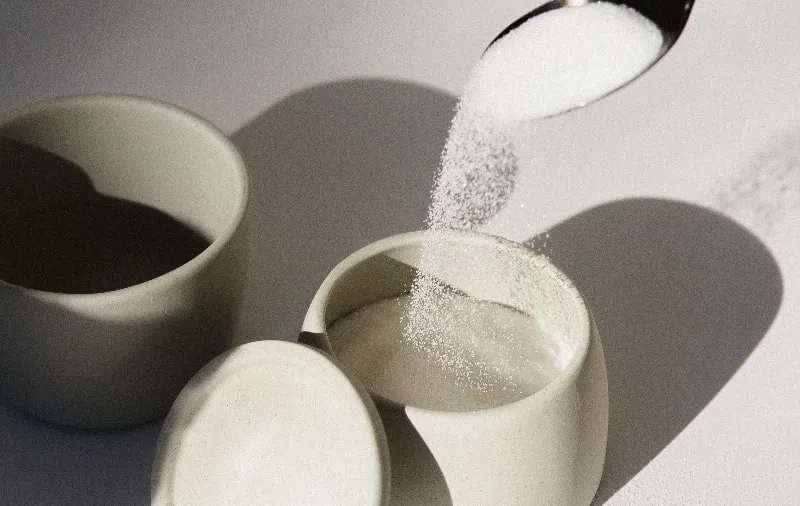In the world we live in, sugar is added to the majority of food, especially commercially made products. Since this is an easy way to improve the overall flavor of a lot of food, it’s no surprise that it’s also in bread.
Adding sugar to bread is an easy way to speed up the breadmaking process and make the bread tastier (and more addicting), but what else does it do to the bread, and is it really necessary?
Adding sugar to bread provides easy food for the yeast, allowing it to produce carbon dioxide faster and therefore leading to faster rising times. As well as this, sugar provides more flavor, tenderizes the crumb, increases browning, and holds onto moisture, which keeps the bread fresh for longer.
Sugar is beneficial to most quick bread recipes, and it’s easy to understand why it’s added. It’s a very useful component of making fast, tasty, and soft bread, but it doesn’t always need to be added.
Adding sugar for the sake of it might leave you with an inferior end product, which obviously isn’t what most people want. If you’re quite happy to just make bread very quickly whilst sacrificing some flavor and texture, then it’s completely fine for you to add it. If you want to get the best bread possible, then it’s not the best idea to add sugar to the majority of bread types.
What Does Sugar Do To Bread?
Adding sugar to bread is the norm in most simple bread recipes, but most people don’t completely understand why, so they might add it for the wrong reasons. Let’s take a deeper dive into what sugar does so you can get a better idea of why you’re adding it.
Decreased Fermentation Time
The most common reason why people add sugar to their bread is to simply decrease the amount of time they need to leave it to rise.
You see, sugar provides ‘easy’ food for the yeast, so they have a much easier time feeding and producing carbon dioxide. Normally, the yeast would have to get the sugar from the starches in the flour, but adding sugar directly to the dough will make it more accessible to the yeast.
Since they can feed on the sugar so quickly, they produce gas more quickly, which therefore results in a faster rise.
Do be careful with this though. Adding too much sugar can have an adverse effect by actually slowing the fermentation. Since sugar is hygroscopic, just like flour, it can absorb too much water, which can either draw water out of the yeast cells (damaging and destroying them) or prevent the yeast from being able to move freely throughout the dough, meaning that they can’t access more food and produce gas.
It Brings Additional Flavor
There’s no doubt about it that sugar makes things taste better. Sugar is added in most areas of the food industry, whether it’s a mass-produced product or just a restaurant adding it to make their food tastier.
Unless a mass-made product specifically states that there’s no added sugar, you can almost guarantee that some sugar been added. Likewise, a lot of restaurants likely add sugar to some of their food.
Sugar is added to a lot of mass-produced bread and home-baked loaves alike simply because it makes them taste better. Although bread can arguably be made to taste even better with enough fermentation time, adding sugar is a easy way to make quick bread taste better (and more addictive).
Increases Browning
When anything becomes golden brown (or overbrowned), it’s due to the sugars in that specific food. That dark crust you get on a beautifully baked loaf of bread is the same as what you get on the outside of a seared steak, kind of. Let me explain.
The browning occurs due to something called the Maillard reaction. To explain it simply, this reaction is when heat caramelizes the sugars in the bread, turning them a deeper brown color, which is both aesthetic and tasty. Without sugar, the bread simply wouldn’t brown properly. This reaction is what makes anything caramelize, like a steak.
If you’ve ever tried to bake overproofed bread, you might have noticed that it doesn’t brown very well, or maybe not at all. This is because the yeast has consumed all the available sugar in the dough, meaning that the Maillard reaction can’t occur.
Adding extra sugar will allow it to caramelize more/faster. Whilst this can be great for smaller baked goods that are baked at a relatively low temperature, bread that contains too much sugar will end up overbrowning or burning if it’s baked for too long or exposed to high heat.
Softens The Crumb
If you’re looking for that soft supermarket-like bread, then sugar might be able to help you.
Since sugar is hygroscopic, it draws moisture away from the flour, which can therefore reduce gluten development. Whilst this isn’t great in bread that requires lots of gluten (generally chewier bread, like a good sourdough loaf), it can be great for bread that you want to have a soft, light texture to them.
Reduced gluten development means that the bread will tear apart easier, which is desirable for some types of bread.
Do keep in mind that you still need enough gluten development for the dough to expand and rise properly, so it’s all about finding a good balance.
Keeps It Fresh For Longer
We all know the struggle of trying to keep bread from going stale. Moisture loss can be quite severe in some types of bread, so having your freshly baked bread going dry or stale within a day or two is far from ideal.
Fortunately, sugar is better at retaining water than flour alone, so it can help your bread stay fresh for a little longer.
Of course, this all depends on how much sugar goes into the bread. Use small quantities, like a tablespoon, and you likely won’t notice a significant difference.
Do You Need To Add Sugar To Bread?
The quick and easy answer to this question is simply, no, you don’t need to add sugar to bread, but that’s not a good enough answer.
You see, a lot of bread doesn’t need any added sugar and it can still taste great, if not even better than most other bread, especially the supermarket stuff. However, there are also a lot of bread types that require sugar to make them what they are.
So, to really answer the question, no, you don’t need sugar in lean or savory bread as this can taste great without it. In fact, this type of bread is best left to ferment for a long time so it can develop flavor on its own. You do need sugar in sweet bread (surprise, surprise), but the primary reason for this is to add the sweet flavor to the bread. It wouldn’t be the same without it.
Why You Shouldn’t Add Sugar To Bread
As you should know, refined sugar isn’t great for anyone’s health. Although it tastes good, it can have some negative health implications if you have too much. Besides, even though it makes bread taste good, you can make bread that tastes even better (more complex flavor) with enough time.
You Can Get A Slower Rise
Whilst this might not sound like a good thing to some, it’s a very good thing to those who want to develop a boat-load of flavor in their bread.
You see, although a fast rise is useful, it’s far from optimal as you’re not getting much of the natural flavor in the bread. With a long, slow rise, you’re allowing the yeast more time to do their work and they are able to break down the complex carbohydrates in the dough. This results in a more complex flavor and a more satisfying bread overall.
An even better option is to leave your dough in the fridge for a day or two in order to amplify the flavor further.
It Might Burn
Sugar in the bread improves browning, but you can definitely get too much of a good thing.
The dough naturally contains sugars that brown easily in the oven, so adding more can throw this natural browning off and actually cause the bread to overbrown or burn before it’s baked through.
This is especially true if you’re baking the bread for a long time or if you’re making bread that’s baked at high heat. Either way, the sugars are likely to burn under these conditions, which is exactly what you want to avoid.
It’s Better For Your Health
There’s no debate that no extra sugar is better than adding sugar. If you’re health-conscious or want to make your bread less unhealthy/lower calorie, it’s smart to cut the sugar out of the recipe if you can.
You’re not sacrificing much if you omit the sugar from normal savoury bread, so don’t become too reliant on it.
If you do choose to skip the sugar, keep in mind that the dough will take longer to rise, but don’t worry about it, it’ll rise eventually and taste better.

